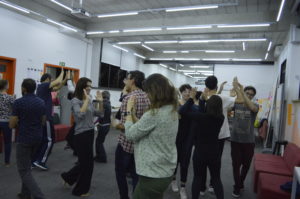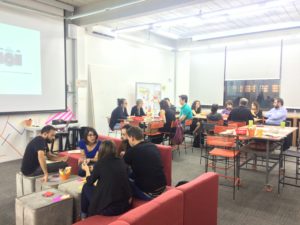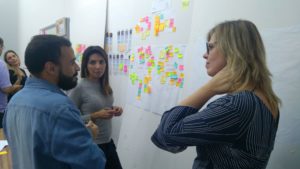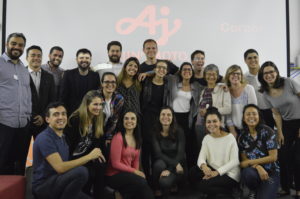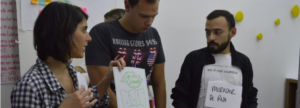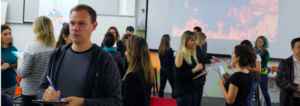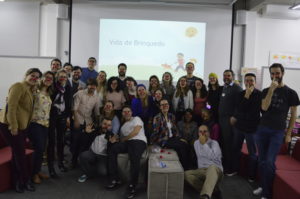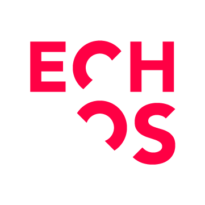Last year, I spent 176 hours specialising in Design Thinking. Proudly, I can now call myself a Design Thinker.
However, receiving such a title was no easy task. Being a Design Thinker is not just a title to add to your LinkedIn profile; it is the result of blood, sweat and tears – as well as reflection, dedication, introspection, loads of “doing” and empathy.
I believe that this is what sets apart a Design Thinking specialist to someone who knows of Design Thinking. During these four months, I found myself completely immersed in a sea of content and practice, that expanded my horizons when it came to my knowledge of innovation, collaboration, world views, empathy and – well – myself.
From this journey, I list below my biggest learnings:
1- Open your mind to the different ways of learning and seeing the world.
To innovate using Design Thinking, it is crucial that you are open to seeing the world from different perspectives. For this very reason, we had different sessions that focused on ethnography, MetaDesign, systemic thinking, circular music, design laboratory, biomimetics, personal presentation and much more. With the help of this repertoire, I was able to better my understanding of people’s relationships, of the relationship of humans and nature, the relationship of social clippings, of our human senses and of the image we project before others.
(In my favourite session – Circular Music – I understood the dynamics of collaboration, leadership and the harmony of teams).
2- Building things together is painful, but fruitful.
It is not easy to create an inclusive, safe space for collaboration. It is important to silence our inner monologues and practice active listening in order to stimulate generating conversations. Although this is not people’s every day’s norm, it is possible to get there with practice. The result is priceless: pluralism in thoughts and views that help solving a complex problem.
(50% of our time during the sessions was allocated to discussing and creating collaboratively).
3- Not getting attached is a must.
After the “safe for collaborating” space is created, get ready for a post-it flood. Sailing in this chaos helps expand your creative potential – but eventually, it will be necessary to funnel your options and converge. In the midst of so much contribution, the power of synthesis is a pre-requisite for productivity. Do not get attached to what doesn’t speak to the pain or necessity of the person behind the problem and exercise your ability to match ideas and concepts.
(When a brainstorming session gives you a thousand ideas, it is necessary to converge and let go of things in order to move ahead).
4- Companies see the value in Design Thinking.
A true statement to that is that fact that companies keep on sending their challenges through to Echos for the Design Thinking Specialisation students to help solve them. In my group, for our last project, we received a brief from a big company in the food industry. A very important education organisation briefed another group. There is nothing that would show how much companies value Design Thinking than the fact that they willingly send their projects to ask for help.
(Another group received this challenge for their last project: to expand the brand beyond the category they are currently part of in the market).
5- “Learn by doing” is the secret to expediting projects.
I learnt that thinking while making your thoughts tangible is a great resource that helps you identify what the most important part of your idea is. When faced with the challenge of prototyping an idea, people are forced to refine and prioritise their concept to show them to other people. Feedback helps us understand what we need t work on and in what aspects we hit the nail on the head. It is a fast, cheap and incredible way to credit or discredit your ideas in a matter of minutes.
6- Keep your brain fit.
Creativity is not a god-sent gift. It is the result of a lot of brain exercising. Putting yourself in situations that make you improvise, feel uncomfortable, find new perspectives is vital to get the results in phases of the process that require the expansion of concepts and ideas. There are many ways to “warm up” your brain before a meeting or creative session, and we learned many of them during our time in the course.
(Pictured: a “brain twister” exercise in which you draw your partner without looking at the sheet).
7- Get up from your desk and talk to people.
You’re not a Design Thinker unless you go out to the streets to get a feel of what the person you are designing for thinks. The basic principle of the Design Thinking process is to step outside the walls of perceptions and pre-concepts to find the real human being that is in your client or partner, and this is only possible if you try to step into that person’s shoes.
(Visiting a homeless shelter during a project that aimed to better the work conditions for shelter volunteers).
8- Learn about yourself
The beauty of Design Thinking is to allow yourself to build ideas based on a knowledge that is free of preconceptions and stereotypes. The more you practice, the more empathy you gain for people that are different to you, and this helps in your professional and personal evolution. In 4 months, I noticed how much more I was participating in the creative sessions, how I was getting better at interviewing people, how my working in team skills bettered; I became better in accepting differences and celebrating small victories.
(A group shot of my team after we completed a challenge).
From this experience, I feel like I have enjoyed the content and the people to the max, and I feel proud. It was beautiful to have been a part of what has already been built, and I cannot wait for what is to come now that I am a Design Thinking Specialist.
*This article was originally written by Beatriz Massaioli. It was translated, adapted and edited by Rani Ghazzaoui Luke.
—
Follow us on social
Instagram – Facebook – LinkedIn – Youtube
How Can We Help?
- For training and Innovation Journeys in your company: check out our in-house course offering.
- For upcoming courses in your region: visit our website.
- For upcoming events in your region: look at our event calendar.
- If you have a special project and would like to use Echos’ consultancy services: send us an email.
- Want to speak to a real person? Call us on 1300 502 006


